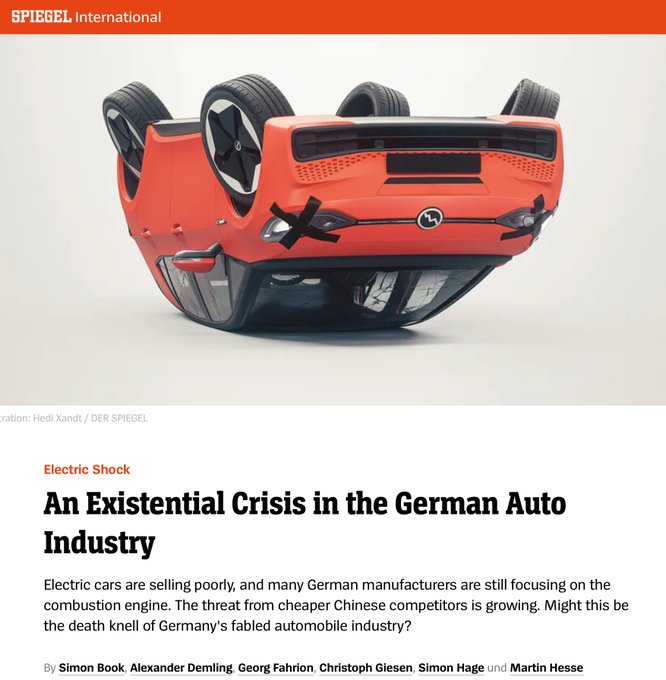This is a problem of most of the western car OEM industry and has certainly become a threat to their businesses and national economy. The temptation to implement trade barriers, against China, is evidently big. But would most likely widen even further the technological advantage and cost advantage China has already achieved.
https://x.com/D_Jimenez_Sch/status/1774151932149387637?s=20
Germany is suffering from a bad case of cognitive dissonance with its car industry.
A cover article in Der Spiegel describes some of the misery.
Clinging to the old ways would be economic suicide.
But the temptation is great to delay the death of the lucrative combustion engine for as long as possible. Mercedes-Benz boss Ola Källenius, who until recently wanted to go all-electric, is suddenly questioning the European Union's decision to phase out combustion engines by 2035. He says he doesn't know when the last gasoline or diesel car will be sold.
The article is en english, link below.
Summary: The article from Der Spiegel discusses the existential crisis facing the German auto industry as it transitions from internal combustion engines to electric vehicles.
Here are the key points: -
Caritas, a Catholic charity organization in Germany, became an early adopter of electric vehicles five years ago when it purchased 114 electric cars and 45 e-bikes for its fleet.
At the time, German automakers were still focused on diesel and gasoline engines. - The shift to electric vehicles poses a major threat to Germany's sprawling car industry, which accounts for €500 billion in revenue and employs around 10 million people directly and indirectly.
Electric cars require fewer mechanical components and less factory labor compared to traditional vehicles. - The industry has been slow to adapt, with management, unions, lobbyists and politicians largely in denial about the need for radical transformation until recently.
German brands now face stiff competition from Tesla and Chinese imports as they play catch-up in the electric vehicle market. - Smaller suppliers that make components for combustion engines are at risk, with predictions that up to 42% of jobs in powertrain production could be lost.
Major suppliers like ZF Friedrichshafen have had to cut jobs and retrain workers to survive the transition. - The European Commission has launched a probe into Chinese electric vehicle imports, a move that could fundamentally alter EU trade and industrial policy if tariffs are enacted. This is seen as an attempt to protect Europe's industrial base and avoid losing jobs and production to China. - German automakers are accused of arrogance and shortsightedness in their response to the electric vehicle revolution.
Despite warnings, they failed to go "all in" on electrification and now risk losing market share to upstarts like Tesla and Chinese manufacturers.
The German auto industry faces a perfect storm of challenges as it navigates the shift to electric mobility, with major implications for jobs, trade, and the country's industrial future.
Adapting quickly and strategically will be critical to avoid the fate of other once-dominant manufacturing hubs.
https://x.com/stekkerauto/status/1773998539305091415?s=20

- Forums
- ASX - General
- Its Over
This is a problem of most of the western car OEM industry and...
- There are more pages in this discussion • 584 more messages in this thread...
You’re viewing a single post only. To view the entire thread just sign in or Join Now (FREE)




